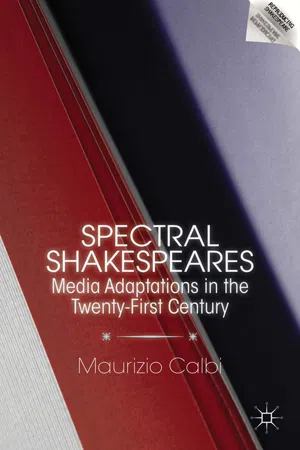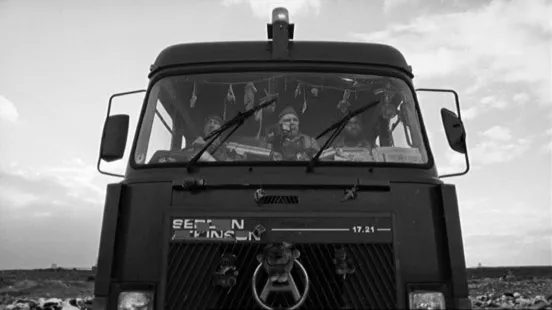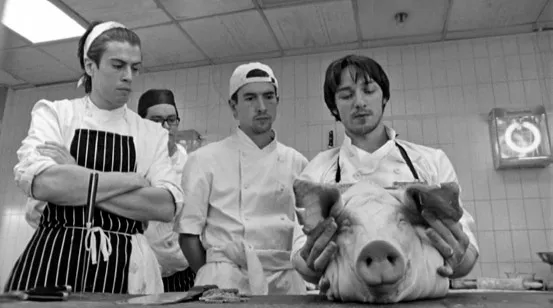
This is a test
- English
- ePUB (mobile friendly)
- Available on iOS & Android
eBook - ePub
Book details
Book preview
Table of contents
Citations
About This Book
Spectral Shakespeares is an illuminating exploration of recent, experimental adaptations of Shakespeare on film, TV, and the web. Drawing on adaptation studies and media theory as well as Jacques Derrida's work, this book argues that these adaptations foreground a cluster of self-reflexive "themes" - from incorporation to reiteration, from migration to addiction, from silence to survival - that contribute to the redefinition of adaptation, and Shakespearean adaptation in particular, as an unfinished and interminable process. The "Shakespeare" that emerges from these adaptations is a fragmentary, mediatized, and heterogeneous presence, a spectral Shakespeare that leaves a mark on our contemporary mediascape.
Frequently asked questions
At the moment all of our mobile-responsive ePub books are available to download via the app. Most of our PDFs are also available to download and we're working on making the final remaining ones downloadable now. Learn more here.
Both plans give you full access to the library and all of Perlego’s features. The only differences are the price and subscription period: With the annual plan you’ll save around 30% compared to 12 months on the monthly plan.
We are an online textbook subscription service, where you can get access to an entire online library for less than the price of a single book per month. With over 1 million books across 1000+ topics, we’ve got you covered! Learn more here.
Look out for the read-aloud symbol on your next book to see if you can listen to it. The read-aloud tool reads text aloud for you, highlighting the text as it is being read. You can pause it, speed it up and slow it down. Learn more here.
Yes, you can access Spectral Shakespeares by M. Calbi in PDF and/or ePUB format, as well as other popular books in Literature & Literary Criticism in Poetry. We have over one million books available in our catalogue for you to explore.
Information
CHAPTER 1
The State of the Kitchen: Incorporation and “Animanomaly” in Scotland, PA and the BBC Shakespeare Retold Macbeth
In an interview with Jean-Luc Nancy, Jacques Derrida underlines the dominant “carnivorous” and “sacrificial” structure of the human subject: “The subject does not want just to master and possess nature actively. In our cultures he accepts sacrifice and eats flesh.” Playing on the double meaning of the French word chef (i.e., chef as the head of the kitchen; chef as the political head of a state), he adds: “The chef must be an eater of flesh (with a view, moreover, to being ‘symbolically’ eaten himself)” (“‘Eating Well’” 114).1 Derrida’s somewhat elliptic—almost Freudian—observations suggest that sovereignty, including sovereignty over one’s self, has to do with eating the “other,” and that this incorporation—a “symbolic” operation when the human animal is involved; a “real” and “symbolic” one in the case of the nonhuman animal (112)—is by its very nature made of repeated performances.2 Like each and every act of violent foundation, incorporation is not achieved once and for all, not least because it is irresistibly haunted by the specter of that which is being incorporated. Moreover, as Derrida parenthetically remarks, it is potentially reversible.
Derrida’s comments on incorporation, combined with his rigorous problematization of the distinction between the human and nonhuman animal, especially in his latest work,3 inform this chapter’s reading of two adaptations of Macbeth: Billy Morrissette’s Scotland, PA (2001), premièred at the Sundance Film Festival, and Peter Moffat’s Macbeth (2005), directed by Mark Brozel and first shown as part of the BBC Shakespeare Retold TV series.4 These adaptations arguably take their cue from the play’s many references to food, animals that prey and are preyed upon, banqueting and hospitality, and creatively transform them. They also enter into dialogue with scenes from previous adaptations in which one or more of these elements play a prominent role, such as Ken Hughes’s Joe Macbeth (1955) and William Reilly’s Men of Respect (1990).5 They repeatedly foreground incorporation and its uncanny effects. The chapter argues that incorporation operates on a number of interconnected levels: it indicates, for instance, the conspicuous consumption of the flesh of the animal, the symbolic ingestion of the “sacrificial victim,” and the inclusion of media material. It shows that incorporation is inextricably bound up with these adaptations’ frequent shift into a self-reflexive mode, and so much so that it often allegorizes the multifaceted ways in which they engage with the adapted text.
Billy Morrissette’s Scotland, PA is set in a small town in 1970s rural Pennsylvania. In this film Pat (Maura Tierney) and Joe “Mac” McBeth (James LeGros) work for Norman “Norm” Duncan (James Rebhorn), the owner of a dowdy burger restaurant, Duncan’s Café. Pat and Mac are both frustrated in their jobs, and this is exacerbated by the fact that, after the dismissal of the diner’s dishonest manager, Douglas McKenna, Duncan announces that he will promote his son Malcom (Tom Guiry) to the role of manager, even though Malcom is more interested in being a rock musician than in his father’s business. The two self-proclaimed “underachievers” conspire to murder Duncan to gain ownership of the restaurant. The BBC Shakespeare Retold Macbeth centers around the world of Duncan Docherty’s classy restaurant and explores its dark corners. It emphasizes the process of cooking, serving, and—last but not least—disposal of food. The witches become garbage collectors. Macbeth turns into Joe Macbeth (James McAvoy), an ambitious Scottish head-chef whose fundamental contribution to the success of the restaurant is not properly acknowledged. As to Lady Macbeth, she becomes Ella Macbeth (Keeley Hawes), a glamorous manageress who impeccably presides over the establishment’s dining room. The Macbeths’ resentment intensifies when Duncan’s diner is awarded “three big Michelin stars,” as the witches/garbage collectors had predicted, and Duncan (Vince Regan) reveals that he will leave the restaurant to his son Malcom (Toby Kebbell), a former vegetarian who does not appear to have cooking “in his blood.”
Both adaptations draw attention to acts of incorporation from the very beginning. Scotland, PA opens with the three witches-turned-hippies sitting on a Ferris wheel in what looks like a disused Carnival Fair. They smoke dope, eat from a bucket of fried chicken, and “dis-member” the textual body of the first scene of Macbeth: “It was foul . . . The fowl [i.e., the chicken] was foul . . . and the Fair was fair . . . Foul’s fair . . . the Fair is foul.” Yet the consumption of pieces of fried chicken seasoned with remainders from Shakespeare’s play does not seem to be part of a healthy diet. Indeed, this (double) incorporation repeats on the female witch, as the two male witches clarify: “She’s having a spell . . . Oh God, so dramatic.” As Thomas Cartelli and Catherine Rowe remind us, in this context “having a spell” means “feeling queasy and disoriented (because you ate bad chicken)” (114). But it also irresistibly suggests a conjuring of another medium within the cinematographic medium. More specifically, “having a spell” also means the evocation of the American television police series McCloud within the film: the opening sequence ends with the inclusion of an extended black-and-white excerpt from the 1972 McCloud episode “The Park Avenue Rustlers,” a TV repeat in which a well-dressed quasi-corporate “bad guy” (Eddie Albert) is brought to justice by detective McCloud (Denis Weaver), who pursues him by hanging beneath the helicopter in which he is trying to escape.6 Placed as it is in such a prominent position, the sequence is undoubtedly significant, and works in a number of different ways. It is, first of all, one of the versions of “the battle . . . lost and won” (Mac. 1.1.4) within the film and, more generally, of the tumultuous state the witches in Macbeth call “hurly-burly” (3). It is, moreover, a visual “pre-diction.” It is some kind of visual foretelling of events that takes place before the actual meeting between the hippies and Mac, and that uncannily connects with subsequent scenes, maybe also by virtue of the mere fact that these scenes involve a series of “Mc”s: for instance, the public humiliation of Manager Douglas McKenna, caught out embezzling money from the diner’s till, which whets Mac’s appetite for his post; or, more generally, detective McDuff’s relentless, if quirky, pursuit of the would-be small-town entrepreneur Joe “Mac” McBeth.7 Perhaps more importantly, the inclusion of the McCloud excerpt draws attention to the film’s typical way of proceeding. It shows that the film self-reflexively folds medium within medium, unashamedly exhibiting not only its impure, hybrid status as a film but also its joyous inability to relate to Shakespeare without conjuring up processes of remediation of the Bard—in this case, televisual remediation—of which it is of course part.8 The McCloud sequence is arguably a remediation of Shakespeare in at least two interconnected senses. It remediates (i.e., it provides a remedy for) the “sickening” surplus-enjoyment one indulges in when misspelling and chewing, as it were, bits and pieces of the Shakespearean corpus.9 It does so by re-presenting Macbeth in a different medium; by offering, that is, a condensed shortened version of Macbeth as a melodramatic black-and-white detective show depicting a world in which “fair” is indeed “fair” and “foul” is indisputably “foul,” a world where one might still be unable “to find the mind’s construction in the face” (1.4.12) but where criminals are brought to justice without much of a hint of ambiguity.10 The sequence is of course placed in ironic quotation marks, and this becomes even clearer when it is repeated later on in the film. This time we are inside the local police station, and we see the sleepy police officer Eddy being so immersed in watching this episode of McCloud that he hardly pays any attention to Anthony “Banko” Banconi’s potential revelations about the Mcbeths’ involvement in the murder of Duncan.11 This scene implies that believing that the black-and-white TV excerpt is an effective or definite remediation of Macbeth—or, indeed, that Scotland, PA as a whole exclusively belongs to the genre of the police serial—is equivalent to occupying the same foolish position as Eddy, a passive consumer who is under the spell of a TV screen and ignores whatever exceeds its frame. In short, the inclusion of the McCloud sequence is an ironic and partial release from a bodily and textual extra-enjoyment, a release that “lies like truth” (5.5.42).12

Figure 1.1 The witches as garbage collectors.
The opening of Peter Moffat’s BBC Macbeth immediately introduces us to liminal domain of waste that haunts acts of conspicuous consumption.13 It is this domain that the witches-turned-garbage collectors mainly inhabit. We are offered a view of a rubbish tip swept by wind and crowded with seagulls.14 Parked right in the midst of this tip is a red lorry adorned with discarded children’s toys. Inside the lorry the three garbage men eat their sloppy sandwiches, mixing day-to-day conversation with lines from Shakespeare’s play.15 After a while, they start talking about the (ungrateful) task they are about to perform: “scooping up the debris” after the “hurly-burly” of a day in Joe Macbeth’s kitchen is “done,” nauseating leftovers that include “bones and guts, fish-heads, knob ends of the black pudding, skins of haggises.” It goes without saying that these leftovers are what allows them to “look into the seeds of time” (1.3.56), and predict—in an inescapably equivocal way—a bright future for Macbeth and Billy/Banquo’s sons. The three men do not fail to pass sarcastic class-inflected comments on the posh restaurant “Duncan Docherty” as well as on its head-chef Joe Macbeth, the “kitchen warrior,” the “cooking brave heart.” The belch one of them emits at the end of the sequence underlines the sarcasm.
Yet the ironic import of the opening sequence can be fully appreciated only by juxtaposing this sequence with the “primal scene” of Joe Macbeth at work in the kitchen, a scene in which he articulates some kind of foundational logic of cooking as absolute incorporation of the nonhuman animal. In this scene “brave” Macbeth’s “brandished steel” (1.2.16–17), with which he “carve[s] out his passage” (1.2.19) until he faces the rebel Macdonald, becomes head-chef Joe Macbeth’s sharp kitchen knife and cleaver; Macbeth’s honorable “unseam[ing] of the rebel from the nave to th’ chops” (1.2.22) turns into Joe Macbeth’s equally honorable slicing and dicing of a pig’s head.16 The atmosphere in Macbeth’s kitchen is that of male camaraderie, extremely jovial and relaxed: just before Joe performs the dissection of the pig’s head, all the kitchen assistants are singing a well-known old tune, The Ronettes’ “Baby, I love you!” What follows is part of the speech Joe delivers as he performs his “anatomy lesson”—his “execution” (1.2.18)—before his staff:
First rule in a kitchen: respect . . . See this animal [takes the pig’s head in his hands] . . . this animal was noble, highly intelligent, feeling . . . It died for us, never forget that . . . First off with the ears [cuts off the pig’s ears] . . . then you want to cut down the front of the face . . . Get a cleaver [cuts off the rest of the pig’s head] . . . Now this is everything: ears, cheeks, tongue, brain . . . no waste: that, in a word, is respect. Anybody can make it in the kitchen, if they’ve got the guts and the passion.
From Joe’s perspective, therefore, “respect” for (what he calls) the animal paradoxically means the latter’s utter disappearance through repeated acts of incorporation (“no waste”).17 It coincides with the absolute consumption of a creature that willingly sacrifices itself (“it died for us”) for the sake of the (re)construction of a carnivorous virile human subject. This subject can be called “virile,” following Derrida’s definition of the human subject as carno-phallogocentric (“‘Eating Well’” 113), first of all because the dissection is performed before an all-male audience; second, because the pig’s head is clearly gendered in the feminine, as shown by the fact that Ronnie, one of the kitchen assistants, puts emphasis on the words “Baby, I love you!” (from the song by The Ronettes) as he lays down the animal’s head on the table. Derrida also underlines that the dominant schema of the carno-phallogocentric subject is fraternal. And, indeed, in Macbeth’s kitchen, it is the lifeless gendered body part of the animal that allows the temporary creation of a potentially horizontal fraternal bond between men (“Everybody can make it in the kitchen”). In short, (gendered) MEAT appears to make a (fraternal) TEAM (i.e., MEAT’s anagram).

Figure 1.2 Joe’s anatomy lesson.
Leftover food—the outcome of the daily “hurly-burly” in both the kitchen and the restaurant—accumulates in the “dark alley” that runs alongside the classy restaurant, which is the place the witches regularly frequent. This constitutes a reminder of the impossibility of bringing to fruition the project of absolute consumption of the animal. In other words, in spite of what Joe enunciates, there is, indeed, waste. This combines with the striking images of mountains of rubbish in the opening sequence to suggest that “man” cannot quite come back to “himself” through the incorporation of the animal without leaving traces of this process in the form of food remains or other leftovers. Significantly, just before the meeting between the garbage collectors and Macbeth and Billy/Banquo, we are shown a wheelie bin rolling down the “dark alley.” This bin nearly crashes to death Macbeth and Billy, who are returning from a drinking session in a pub. Printed in capital letters on the bin is the word MEAT. One thus witn...
Table of contents
- Cover
- Title
- Introduction: Shakespeare, Spectro-Textuality, Spectro-Mediality
- Chapter 1 The State of the Kitchen: Incorporation and “Animanomaly” in Scotland, PA and the BBC Shakespeare Retold Macbeth
- Chapter 2 Shakespearean Retreats: Spectrality, Survival, and Autoimmunity in Kristian Levring’s The King Is Alive
- Chapter 3 Reiterating Othello: Spectral Media and the Rhetoric of Silence in Alexander Abela’s Souli
- Chapter 4 “This Is My Home, Too”: Migration, Spectrality, and Hospitality in Roberta Torre’s Sud Side Stori
- Chapter 5 “Shakespeare in the Extreme”: Ghosts and Remediation in Alexander Fodor’s Hamlet
- Chapter 6 “Restless Ecstasy”: Addiction, Reiteration, and Mediality in Klaus Knoesel’s Rave Macbeth
- Chapter 7 “He Speaks . . . Or Rather . . . He Tweets”: The Specter of the “Original,” Media, and “Media-Crossed” Love in Such Tweet Sorrow
- Notes
- Bibliography
- Index